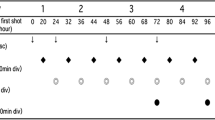Summary
The purpose of this phase I study was to evaluate the toxicity and biological activity of autologous blood-derived macrophages activated ex-vivo with recombinant human interferon γ (rhuIFNγ) [monokine-activated killer (MAK) cells] and administered intravenously to 11 lung cancer patients once a week for 6 consecutive weeks. Peripheral blood monocytes were collected by leukapheresis and then purified by counterflow elutriation. The MAK cells were generated by culturing the purified monocytes in Teflon bags for 7 days and adding rhuIFNγ to the cultured cells for the last 18 h. These MAK cells expressed differentiation-associated surface antigen MAX1, and were cytotoxic in vitro against tumour cell line U937. The MAK cells were infused at dose levels from 1 × 107 to 5 × 108 on an intrapatient dose-escalating schedule. No severe adverse side-effects occurred. Toxicity was mild to moderate [primarly fever (75%) and chills (32%)], non-dose-dependent, and non-cumulative. No consistent change in haemostatic function, or liver or renal function was observed. Dose-limiting toxicity was not reached at 5 × 108 cells (optimal dose reproduced for each patient). The maximum tolerated dose was not determined. The immunomodulatory activity of i.v. infused MAK cells was demonstrated both in vivo by significant increases in granulocyte count and neopterin level in the patients' peripheral blood postinfusion and in vitro by secretory products (IL-1. TNFα, neopterin, and thromboplastin-like substance) in the culture supernatants. The in vivo traffic patterns of autologous MAK cells labelled ex-vivo with111In oxine were studied in 7 patients. Gamma imaging showed an immediate but transient lung uptake (<24 h), and a progressive uptake of radioactivity in the liver and spleen was seen from 6 h to 72 h post-infusion. Our results indicate that the preparation of high numbers of autologous, blood-derived MAK cells is a feasible procedure, and their transfusion is safe for patients. This immunotherapeutic approach seems to be encouraging from the point of view of establishing an adjuvant therapeutic modality in cancer patients with minimal residual disease.
Similar content being viewed by others
References
Andreesen R, Bross KJ, Osterholz J, Emmerich F (1986) Human macrophage maturation and heterogeneity: analysis with a newly generated set of monoclonal antibodies to differentiated antigens. Blood 67: 1257
Andreesen R, Scheibenborgen C, Brugger W, Krause S, Engler H (1990) Adoptive transfer of tumor cytotoxic macrophages generated in vitro from circulating blood monocytes: a new approach to cancer immunotherapy. Cancer Res 50, 23: 7450
Barak M, Merzbach D, Gruener N (1989) The effect of immunomodulators on PHA or IFNγ induced release of neopterin from purified macrophages and peripheral blood mononuclear cells. Immunol Lett 21: 317
Bartholeyns J, Lombard Y, Poindron P (1988) Immunotherapy of murine sarcoma by adoptive transfer of resident peritoneal macrophages proliferating in culture. Anticancer Res 8: 145
Chokri M, Freundenberg M, Gallanos C, Poindron P, Bartholeyns J (1989) Compared antitumoral effects of LPS, TNF, IFNγ and activated macrophages on experimental tumors. Synergism and tissue distribution. Anticancer Res 9: 1185
Dumont S, Hartmann D, Poindron P, Oberling F, Faradji A, Bartholeyns J (1988) Control of the antitumoral activity of human macrophages produced in large amounts in view of adoptive transfer. Eur J Clin Oncol 24, 11: 1691
Eischen A, Vincent F, Bergerat JP, Louis B, Bohbot A, Faradji A, Oberling F (1991) Long term cultures of human monocytes in vitro: impact of GM-CSF on survival and differentiation. J Immunol Methods (in press)
Faradji A, Bohbot A, Schmitt-Goguel M, Bergerat JP, Herbrecht R, Dufour P, Dumont S, Camilla C, Archipoff G, Bartholeyns J, Poindron P, Oberling F (1989) Isolation of a large number of human blood monocytes using the Beckman JE-5.0 elutriation rotor in view of adoptive immunotherapy. Exp Cell Biol 57: 93
Faradji A, Bohbot A, Frost H, Schmitt-Goguel M, Siffert JC, Dufour P, Eber JL, Lallot C, Wiesel ML, Bergerat JP, Oberling F (1991) Phase I study of liposomal MTP-PE activated autologous monocytes administered intraperitoneally to patients with peritoneal carcinomatosis. J Clin Oncol (in press)
Fidler IJ (1974) Inhibition of pulmonary metastases by intravenous injection of specifically activated macrophages. Cancer Res 34: 1074
Fidler IJ (1978) Recognition and destruction of target cells by tumoricidal macrophages. Isr J Med Sci 14: 177
Gauldie J, Richards C, Harnish D (1987) Interferon β2/B-cell stimulatory type 2 shares identity with monocyte-derived hepatocyte-stimulating factor and regulates the major acute phase protein response in liver cells. Proc Natl Acad Sci USA 84: 7251
Grimm EA, Mazumder A, Zhang HZ, Rosenberg SA (1982) Lymphokine-activated killer cell phenomenon. Lysis of natural killer resistant fresh solid tumor cells by interleukin-2 activated autologous human peripheral blood lymphocytes. J Exp Med 155: 1823
Helle M, Brakenhoff JPJ, De Groot ER (1988) Interleukin 6 is involved in interleukin 1-induced activities. Eur J Immunol 18: 957
Huber C, Batchelor JR, Fuchs D, Hausen A, Lang A, Niederwieser D, Reibnegger G, Swetly P, Trppmair J, Wachter H (1984) Immune response-associated production of neopterin. J Exp Med 160: 301
Le J, Prensky W, Yip YK (1983) Activation of human monocyte cytotoxicity by natural and recombinant immune interferon. J Immunol 131: 2821
Lillimoe K, Lipford E, Eggleston JC (1984) Staging of bronchial carcinoma. Surg Gynecol Obstet 158: 566
Lotze MT, Grimm EA, Mazumder A, Strausser JL, Rosenberg SA (1981) Lysis of fresh and cultured autologous lymphocytes cultured in T-cell growth factor. Cancer Res 41: 4420
Margolin KA, Rayner AA, Hawkins MJ, Atkins MB, Dutcher JP, Fisher RI, Weiss GR, Doroshow JH, Jaffe HS, Roper M, Parkinson DR, Wiernick PH, Creekmore SP, Boldt DH (1989) Interleukin-2 and lymphokine-activated killer cell therapy of solid tumors: analysis of toxicity and management guidelines. J Clin Oncol 7, 4: 486
Mule JJ, Shu S, Schwarz SL, Rosenberg SA (1984) Adoptive immunotherapy of established pulmonary metastases with LAK cells and interleukin-2. Science 225: 1487
Rosenberg SA, Lotze MT, Muul LM, Leitman S, Chang AE, Ettinghausen SE, Matory YL, Skibber JM, Shiloni E, Vetto JT, Seipp CA, Simpson C, Reichert CM (1985) Observations on the systemic administration of autologous lymphokine-activated killer cells and recombinant interleukin-2 to patients with metastatic cancer. N Engl J Med 313: 1485
Spiro SG, Goldstraw P (1984) The staging of lung cancer. Thorax 39: 401
Stevenson HC, Foon KA, Sugerbaker PH (1986) Ex vivo activated monocytes and adoptive immunotherapy trials in colon cancer patients. Transfusion medicine: recent technological advances. Liss, New York, p 75
Ulich TR, Del Castillo J, Guo K (1989) In vivo hematologic effects of recombinant interleukin-6 on hematopoeisis and circulating numbers of RBCs and WBCs. Blood 73: 108
Vincent F, Bergerat JP, Eischen A, Faradji A, Bohbot A, Oberling F (1991) Human blood-born macrophages: differentiation in vitro of large quantity of cells in serum-free medium. Exp Hematol (in press)
Author information
Authors and Affiliations
Additional information
This work was supported in part by a grant 6911 from the Association pour la Recherche contre le Cancer (ARC), grants from the Ligue Nationale contre le cancer and the Ligues Regionales (Bas-Rhin, Haut-Rhin) contre le cancer, and contract 891013 from the Institut National pour la Santé et la Recherche Médicale (INSERM), France
Rights and permissions
About this article
Cite this article
Faradji, A., Bohbot, A., Schmitt-Goguel, M. et al. Phase I trial of intravenous infusion of ex-vivo-activated autologous blood-derived macrophages in patients with non-small-cell lung cancer: Toxicity and immunomodulatory effects. Cancer Immunol Immunother 33, 319–326 (1991). https://doi.org/10.1007/BF01756597
Received:
Accepted:
Issue Date:
DOI: https://doi.org/10.1007/BF01756597




